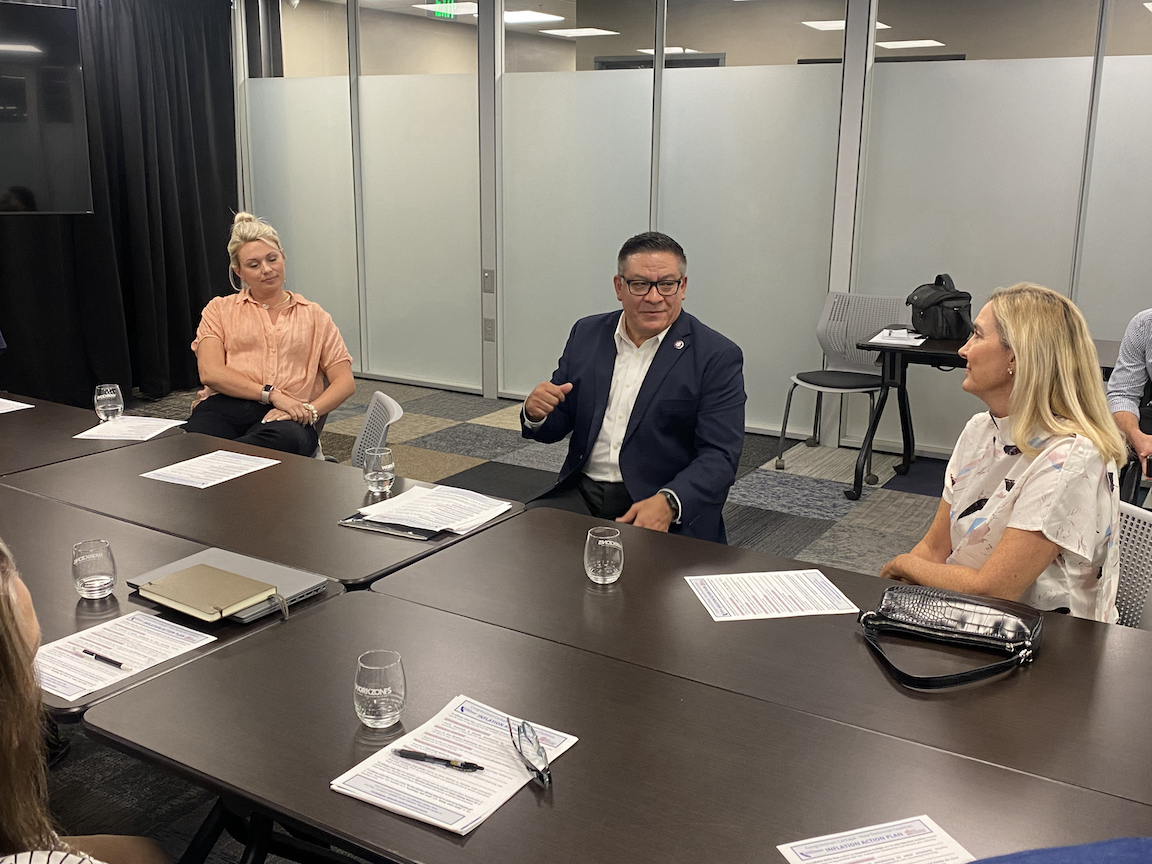Santa Barbara County business owners bend Carbajal’s ear on inflation, economy
IN THIS ARTICLE
- Latest news Topic
- pacbiztimes Author
By pacbiztimes Tuesday, July 26th, 2022

With rising prices and subsequent disruptions brought on by the COVID-19 pandemic, businesses in the Tri-Counties are facing a tsunami of challenges.
U.S. Rep. Salud Carbajal, D-Santa Barbara, hosted in-person roundtables with business owners and chamber of commerce leaders in San Luis Obispo on July 22 and in Santa Barbara on July 25, to discuss concerns about inflation and the economy.
“People are dealing with inflation on a daily basis,” Carbajal told the Business Times at the roundtable in Santa Barbara. “It’s impacting our lives. It’s impacting commerce.”
In June, the House’s New Democrat Coalition, of which Carbajal is a member, released a plan to combat inflation. The Inflation Action Plan was developed with Carbajal and his colleagues in consultation with economists and policy experts to tackle short- and long-term inflationary pressures, according to a news release from Carbajal’s office.
The plan calls for action on several priorities, including supporting domestic manufacturing, boosting the U.S. workforce, increasing affordable housing access and accelerating clean energy transition. It also includes lowering prescription drug costs and expanding tax credits for middle-class families.
At the July 25 roundtable, Joey Zumaya of LinkedIn, a major employer in Carpinteria, said the plan’s emphasis on boosting the U.S. workforce stood out to him. The Microsoft-owned LinkedIn platform has roughly 58 million companies offering 14 million to 17 million jobs at any given time, Zumaya said.
“Under the concept of the future of work, we’re trying to create a platform that does skills-based hiring, as opposed to degree-based hiring,” he said.
The federal government’s investment in the Workforce Opportunity and Innovation Act and continued funding for workforce development programs are important long-term investments, said Zumaya, who also is the vice chair of the Santa Barbara South Coast Chamber of Commerce Board of Directors.
“Most of the jobs that will exist tomorrow, they don’t exist today, and the skills required for those jobs have yet to be identified because things are shifting so rapidly,” he said.
Carbajal told the group in Santa Barbara that business owners have told him about their difficulties in acquiring equipment to keep their businesses running, given the problems with global supply chains and inflation. Other big economic issues include housing costs and child care, he added. The group also discussed child care programs and businesses offering on-site child care.
Trevor Large, the managing partner at the Santa Barbara law firm Fauver, Large, Archbald and Spray, said he has been kicking around the idea of an incentive for businesses, such as a tax credit, to provide on-site child care.
“It’s always helping people pay for child care, but why not help the businesses provide child care for their employees?” said Large, who is the Santa Barbara South Coast Chamber of Commerce’s board chair.
Anne Pazier, the owner of Santa Barbara Gift Baskets, addresses some of the challenges specific to small businesses. Her business offers gifts featuring local foods, wines and beers. She competes with the retail giant Amazon.
“They have free shipping, which is probably a lot of why the clothing stores, boutiques and things on State Street don’t look the way that they used to,” Pazier said.
Soaring rents and the housing shortage were also mentioned at the roundtable in Santa Barbara. Glenn Morris, president and CEO of the Santa Maria Valley Chamber of Commerce, asked Carbajal where he sees the federal government impacting housing.
Carbajal said 80% of all affordable housing in the U.S. has been made possible through the federal low-income housing tax credit. There’s been discussion about creating more incentives for states and communities to produce certain housing, he said.
“There has been talk the federal government needs to step it up and work with states that haven’t done as good,” Carbajal said.
Carbajal’s first roundtable was July 22 in San Luis Obispo. Labor challenges in the agricultural industry and the limited housing supply were topics at the gathering in San Luis Obispo, Carbajal said.
Related Articles
 Wednesday, November 9th, 2022
Wednesday, November 9th, 2022
U.S. economy in relatively strong shape, UCSB economist says in Ventura
 Friday, October 7th, 2022
Friday, October 7th, 2022
Elected officials talk up need for housing, inflation control at South Coast Chamber forum
 Friday, September 16th, 2022
Friday, September 16th, 2022








